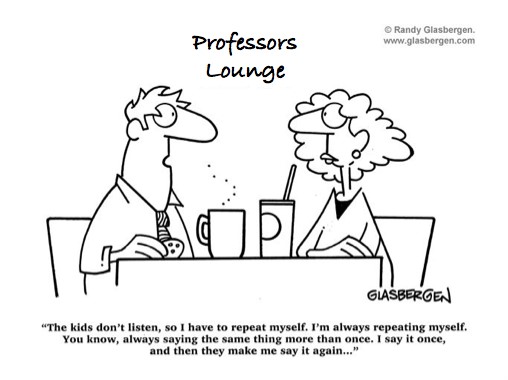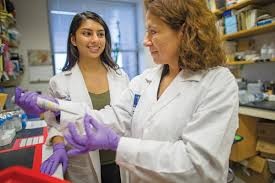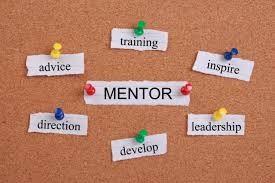|
Author: Michael Kalichman, 2001 Contributors: P.D. Magnus, Dena Plemmons Updates: Jamie Schiffer, 2016 |
Definition
Definition of a mentor (NAS, 1997):
In the broad sense intended here, a mentor is
someone who takes a special interest in helping another person develop into a successful professional.

| Image from Piled Higher and Deeper by Jorge Cham http://www.phdcomics.com/comics/archive.php?comicid=892 |
- Has experience with the challenges that will be faced by a mentee
- Communicates experience to the mentee
- Assists the mentee in understanding and adhering to the standards of conduct within their profession
- Teaches responsible conduct explicitly and by example
Mentoring involves both:
- what is verbalized and
- what is demonstrated in practice.

| Image from http://www.glasbergen.com... |
Why is mentorship an ethical concern?
Mentoring:
- Should encompass ethical discussions about best research practices including authorship, collaboration, conflicts of interest, data management and more.
- By senior researchers passes informal and often unwritten standards from one generation of scientists to the next.

| Image from http://blog.mountsinai.org/blog/become-mentor |
Such mentoring may readily occur within a small research group, but:
- Some research groups are too large or competitive.
- Issues of responsible conduct are discussed infrequently (Anderson et al. 1994).
An absence of effective mentoring means that:
- Principles of decision-making are not explicit and are therefore open to interpretation and misinterpretation.
- Many important roles of scientists, such as peer review and negotiating collaborations, are not explicitly introduced to the mentee.
- The integrity of research is at risk (Wright et al., 2008).
Effective, ethical, and successful mentors should:
- Help mentees in their technical development
- Inspire mentees in their current work
- Provide advice on working in teams and leadership
- Socialize mentees in the political, ethical, economic, and social dynamics of academia
- Inform about administration, planning, and budget management
- Address special circumstances related to gender, race, national origin, language, or disability
- Teach about teaching and mentoring
- Assist mentees with the job market

| Image from https://www.insidehighered.com... |
Responsibilities of Mentors and Mentees
Many excellent resources are available to learn about guidelines, best practices, and recommendations for effective mentoring (e.g., Swazey and Anderson, 1996; NAS, 1997; University of Michigan, 2010, 2011).
- The importance of mentoring for training in the responsible conduct of research has been recognized in both research studies (Anderson et al., 1994; Swazey and Anderson, 1996; Douglas-Vidas et al., 2001; Wright et al., 2008) and national reports on the integrity of research (Institute of Medicine, 1989; NAS, 1997).
- For example, the Institute of Medicine (1989) noted the importance of mentors and specifically recommended that departments and research units should monitor the supervision and training of young scientists to ensure that it is adequate (Committee on Science, Engineering, and Public Policy, 2000).
- Some students, particularly those working in large laboratories and institutions, find it difficult to develop a close relationship with their faculty adviser or laboratory director.
- They might have to find their mentor elsewhere - perhaps a fellow student, another faculty member, a wise friend, or another person with experience who offers continuing guidance and support.
- Additionally, widely ranging needs at different stages of a career are not likely to be met by a single mentor, and few established scientists can offer the requisite time, knowledge, and interest to the full range of issues likely to confront a mentee.

| Image from http://www.forbes.com/sites/brianrashid... |
- Guide rather than decide for your mentee
- Seek out mentees whose personality aligns with yours
- Model good skills and behavior
- Seek out as many mentors as needed, each of whom can provide the expertise and experience to help fulfill your needs
- Seek out a mentor whose personality aligns with yours
- Act based on your own values, goals, and experience
Discussion Questions
- Discuss the role of mentoring in promoting the responsible conduct of research.
- What are the roles and responsibilities of principal investigators in promoting effective mentoring relationships?
- About which aspects of your career path did you feel least prepared?
- What mentors have you had in the past that have helped you get where you currently are?
- What are the characteristics of an effective mentor? What similarities and differences characterize mentors and supervisors?
- What do you currently do well as a mentor?
- What do you think you could improve upon as a mentor?
- Do you think that any of the items listed for “Effective Mentorship” are outside your responsibility? Why or why not?
- Discuss the role of mentoring in promoting the responsible conduct of research.
- What are the roles and responsibilities of mentees in promoting effective mentoring relationships?
- About which aspects of your career path do you feel least prepared? Who, or what kinds of people would be best positioned to help fill your needs? How might you initiate or promote a role for one of these people as your mentor?
- What are the characteristics of an effective mentor? What similarities and differences characterize mentors and supervisors?
- What guidelines or programs are in place to promote mentoring in your institution?
- What does your current mentor(s) do well? What could your current mentor(s) improve upon?
- Where else could you look to receive mentoring?
Case Studies
- Anderson MS, Louis KS, Earle J (1994): Disciplinary and departmental effects on observations of faculty and graduate student misconduct. Journal of Higher Education 65: 331-350.
- Brown S, Kalichman MW (1998): Effects of training in the responsible conduct of research: A survey of graduate students in experimental science. Science and Engineering Ethics 4: 487-498.
- Committee on Science, Engineering, and Public Policy (2000): Enhancing the Postdoctoral Experience for Scientists and Engineers: A Guide for Postdoctoral Scholars, Advisors, Institutions, Funding Organizations, and Disciplinary Societies. National Academy Press, Washington, DC.
- Douglas-Vidas J, Ferraro A, Reichman M (2001): Analysis of Guidelines for the Conduct of Research Adopted by Medical Schools or Their Components. Published online by the USPHS Office of Research Integrity.
- Eastwood S, Derish P, Leash E, Ordway S (1996): Ethical issues in biomedical research: Perceptions and practices of postdoctoral research fellows responding to a survey. Science and Engineering Ethics 2: 89-114.
- Institute of Medicine (1989): The Responsible Conduct of Research in the Health Sciences. National Academy Press, Washington, DC.
- Jones NL, (2016): Raising Scientific Experts. American Scientist.
- NAS (1997): Adviser, teacher role model, friend: On being a mentor to students in science and engineering. National Academic Press, Washington, DC.
- NIH (1989): Requirement for programs on the responsible conduct of research in National Research Service Award institutional training programs. NIH Guide for Grants and Contracts 18(45).
- NIH (1992): Reminder and update: Requirement for instruction in the responsible conduct of research in National Research Service Award institutional training grants. NIH Guide for Grants and Contracts 21(43).
- Swazey JP, Anderson MS (1996): Mentors, advisors, and role models in graduate and professional education. Association of Academic Health Centers, Washington, DC.
- University of Michigan (2010): How to Get the Mentoring You Want: A Guide for Graduate Students. Rackham Graduate School.
- University of Michigan (2011): How to Mentor Graduate Students: A Guide for Faculty. Rackham Graduate School.
- University of Wisconsin: Resources for Each Phase of the Mentoring Relationship.
- Wright DE, Titus DL, Cornelison JB (2008): Mentoring and research misconduct: an analysis of research mentoring in closed ORI cases. Sci Eng Ethics. 2008 Sep;14(3):323-36.
